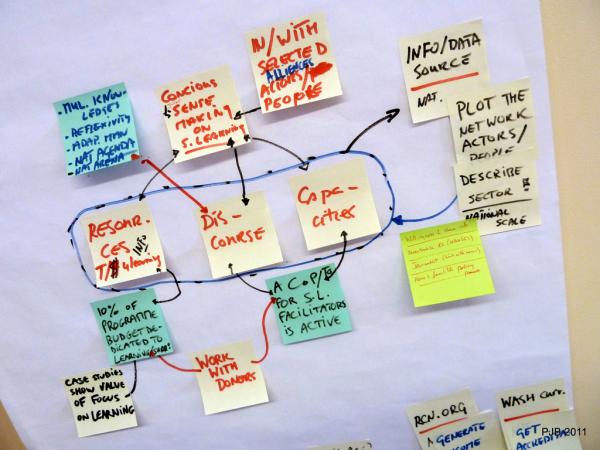Published on: 26/03/2012
Knowledge management (KM) originates from the business sector (see Sveiby link below). The quest for more efficiency and effectiveness use of resources and the recognition that all knowledge - being the fourth production factor besides land, money and labour - resides in peoples' heads, lead to numerous initiatives, tools, methods, methodologies, fads and fools in and around KM. Some thinkers think of KM as nonsense (see Wilson link below).

Having roots is handy and hindering. Stemming from that original organisational context all sorts of KM initiatives / plants and rants, still smell like the source and bring about business metaphors (the winner takes it all, win/win situations, business is like sports, soccer is war etc.), even though the context is completely different. Going down in context scale - from the organisation to the individual keeps 'it' in the family which is an alley to follow. Scaling up by definition introduces 'meeting strangers' to the KM-ers, also looking beyond added value.
Going down in scales - e.g. towards PKM or 'personal KM' - is sort of doable. Most of the times such zooms in. From the organisational level down to branch offices, departments, groups, teams, CoPs, hoards, task forces etc etc down to the individual. Adding depth or multiple layers or working with multiple silos, almost by definition raises issues / problems to tackle and solve with KM. In the end KM revolves around a willingness / attitude to learn and to share and proper or better information handling / management.
Symptoms to cope with range from 'knowledge is power' - as reflecting peoples' position in the hierarchy - to 'happy sharing in the smoking booth or at the water cooler'; the real knowledge sharing happens in the breaks and corridors. Enough hurdles to talk about and most of the times addressable within any organisational setting. As for the KM intervention to chose, size (and distance) does matter. (Pick and choose from the tool-kit at the KS Toolkit link below).
As usual problems arise when one wants to stop. Take smoking and drinking; never a problem until you want to quit. The same goes for PKM, KM and knowledge sharing; once people leave the service- e.g. stop sharing and learning etc - there is a problem to mitigate with exit interviews etc. My favourite instrument here was suggested by Daan Boom: organise a bye bye dinner party!
Working in the development sector always means people have multiple tasks and managing beyond their job description, certainly when dealing with knowledge. Key in fare-well speeches always boils down to 'we do not know how to continue without you (but we are going to try anyway)' which is soo tru! The core success factor of the KM4Dev CoP is the mere fact that one can never leave!
Going up in scale reaches beyond the institutional setting; in my case the WASH sector. Methods outside organisational scale vary from master-class to mega-venues. Of course we are talking adult learning here. The most fun intervention I organised to address KM - a KM walkabout (download below). To me the secret for KM success is getting people out of their comfort zone / cubicle, disconnect them form digital networks and take them for a ride. Yes, de-learn to sit down, shut up and listen as we torture our kids with!
The above photo of an overhead sheets stems from a session with these young water professionals from all over the world I took for a KM walkabout. They defined KM at sector level / scale to have a core of 'Resources' (information. time and budget to learn), 'Discourse' and 'Capacity'. Organisations fit in this picture as vehicles for learning, discourse and capacity development. The focus shifts from effectiveness and efficiency to people.
At IRC we have strong opinions and we value honest and frank discussion, so you won't be surprised to hear that not all the opinions on this site represent our official policy.